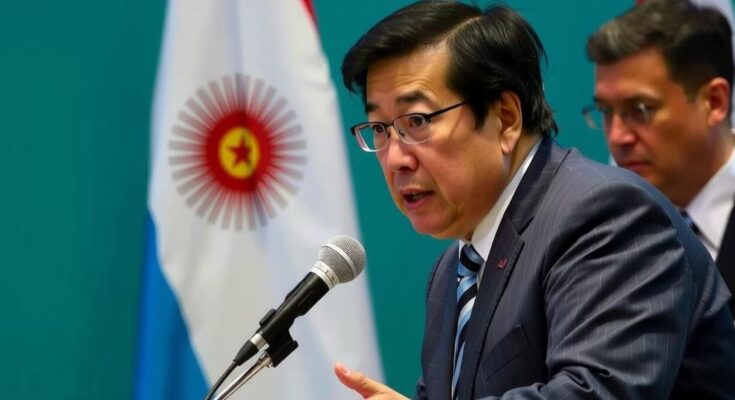President Javier Milei has dismissed Foreign Minister Diana Mondino following Argentina’s support for a U.N. resolution that sought to lift the U.S. embargo on Cuba. This move reflects a shift towards aligning more closely with U.S. and Israeli interests. Mondino’s tenure was marred by controversy, contributing to her dismissal and announced plans for an internal audit of the Foreign Relations Ministry.
Argentina’s President Javier Milei has dismissed Foreign Minister Diana Mondino shortly after the nation supported a United Nations resolution advocating for the lifting of the U.S. economic embargo on Cuba. Mondino was replaced by Gerardo Werthein, the country’s ambassador to the United States, as confirmed by spokesman Manuel Adorni on social media. Although the reason for Mondino’s dismissal was not explicitly stated, it is clear that it follows a divisive vote at the U.N. General Assembly. In a subsequent announcement, Milei’s office articulated that the position was taken due to the country’s stance against the Cuban regime, affirming, “Our country is categorically opposed to the Cuban dictatorship, and it will remain firm in promoting a foreign policy that condemns all regimes that perpetuate the violation of human rights and individual freedoms.” The resolution to lift the embargo received backing from 187 nations, with only the United States and Israel standing in opposition. Since his assumption of the presidency in December 2023, Milei has markedly altered Argentina’s foreign policy by aligning it more closely with that of the United States and Israel. He has been an outspoken supporter of Israeli Prime Minister Benjamin Netanyahu, particularly regarding the recent military actions in Gaza, which contrasts with the responses observed across much of Latin America, where nations such as Bolivia and Colombia have severed ties with Israel, and others, like Brazil, have recalled ambassadors from Tel Aviv. Diana Mondino’s brief tenure as Foreign Minister was characterized by turmoil. Most recently, her office had to retract a press release that mistakenly referred to the “Falklands” instead of the “Malvinas,” the term used in Argentina for the disputed territory. Additionally, Mondino faced significant criticism following remarks made during her visit to China, where she stated that “all Chinese look like the same.” Such incidents have cultivated a narrative of instability surrounding the Foreign Relations Ministry. In light of Mondino’s departure, President Milei’s administration has initiated plans for an internal audit of the Foreign Relations Ministry to identify individuals whose agendas conflict with the government’s dedication to freedom and human rights. As Argentina navigates this transitional phase, the outcomes of these adjustments on its foreign relations remain uncertain. The Milei administration is expected to redefine its international stance in a rapidly transforming geopolitical landscape, which could influence its relationships with both allies and adversaries.
President Javier Milei’s decision to dismiss Foreign Minister Diana Mondino is linked to Argentina’s recent vote supporting a U.N. resolution that challenges the U.S. economic embargo on Cuba. This vote diverges from the foreign policy direction that Milei has promoted since taking office, emphasizing a realignment with U.S. and Israeli interests. Additionally, Mondino’s brief term was marked by missteps and controversies that questioned her effectiveness and contributed to unrest within the Foreign Relations Ministry. The announcement of an internal audit aims to stabilize the ministry and affirm the government’s commitment to human rights and freedom in its diplomatic engagements, especially in a context that sees growing polarization in Latin American foreign policies.
The dismissal of Foreign Minister Diana Mondino by President Javier Milei underscores a significant shift in Argentina’s foreign policy towards greater alignment with U.S. interests, particularly in light of recent contentious U.N. votes. Mondino’s brief, troubled tenure reflects broader challenges within the Foreign Relations Ministry that the Milei administration seeks to address through an internal audit. As Argentina’s foreign policy evolves amid a changing geopolitical environment, the implications for its international relationships are likely to be profound and far-reaching.
Original Source: www.newsweek.com




